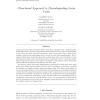Free Online Productivity Tools
i2Speak
i2Symbol
i2OCR
iTex2Img
iWeb2Print
iWeb2Shot
i2Type
iPdf2Split
iPdf2Merge
i2Bopomofo
i2Arabic
i2Style
i2Image
i2PDF
iLatex2Rtf
Sci2ools
NLE
2010
2010
Class-based approach to disambiguating Levin verbs
Lapata and Brew (2004) (hereafter LB04) obtain from untagged texts a statistical prior model that is able to generate class preferences for ambiguous Levin (1993) verbs (hereafter Levin). They also show that their informative priors, incorporated into a Naive Bayes classifier deduced from hand-tagged data, can aid in verb class disambiguation. We reanalyse LB04’s prior model and show that a single factor (the joint probability of class and frame) determines the predominant class for a particular verb in a particular frame. This means that the prior model cannot be sensitive to fine-grained lexical distinctions between different individual verbs falling in the same class. We replicate LB04’s supervised disambiguation experiments on large scale data, using deep parsers rather than the shallow parser of LB04. In addition, we introduce a method for training our classifier without using hand-tagged data. This relies on knowledge of Levin class memberships to move information from u...
| Added | 29 Jan 2011 |
| Updated | 29 Jan 2011 |
| Type | Journal |
| Year | 2010 |
| Where | NLE |
| Authors | Jianguo Li, Chris Brew |
Comments (0)

